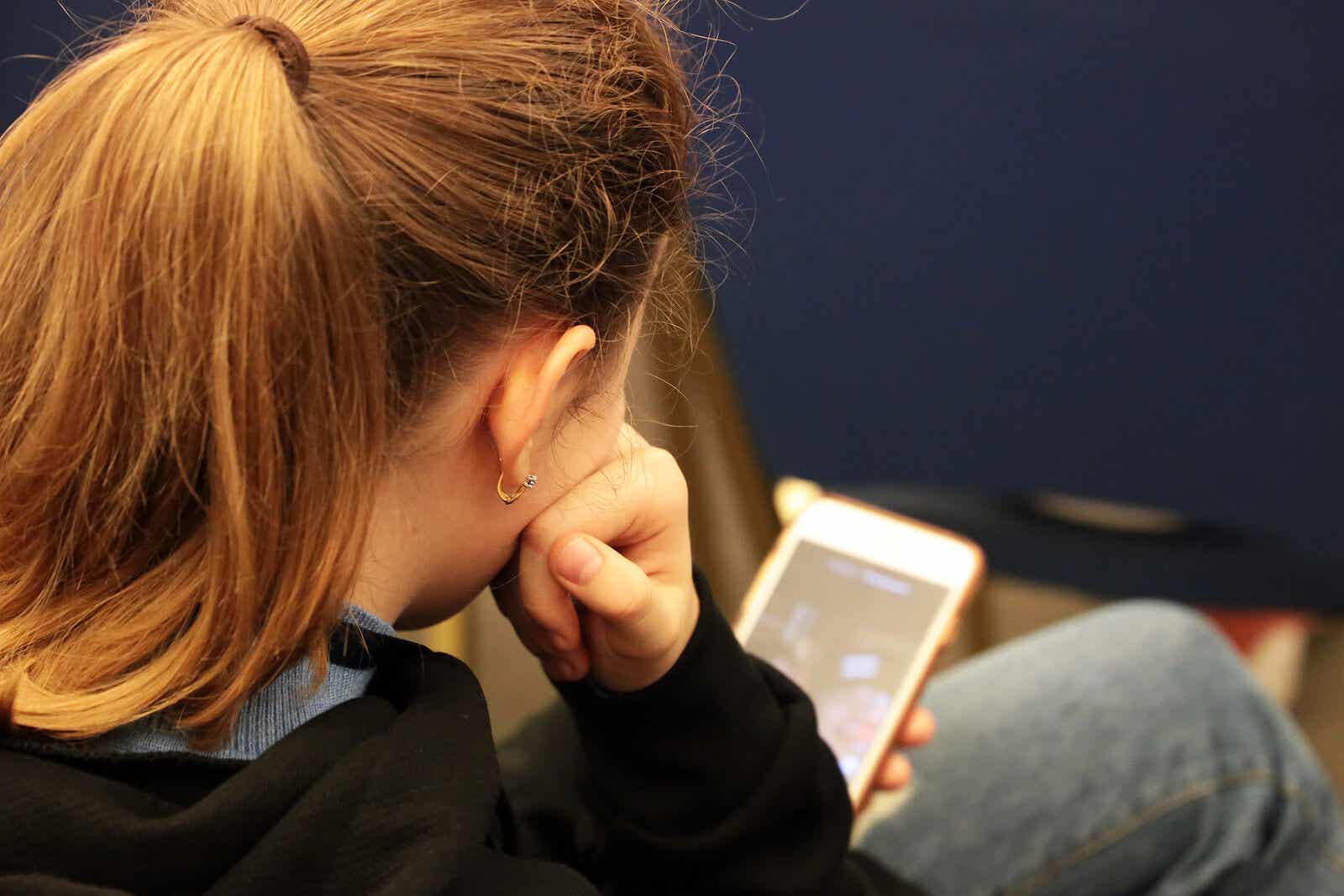How Do I Know If My Child Is Addicted to Their Cell Phone

Is your child constantly on the phone and always online? Do you think they’re addicted to their cell phone? Below, we’ll help you find out if your child has a serious problem related to the use of cell phones.
But first, let’s clarify the concept of “cell phone addiction” also known as “nomophobia”, which comes from the English expression “no-mobile-phone phobia“. This term refers to the irrational fear that some people feel when they don’t have a cell phone for a certain period of time.
This is as worrying as a gambling or drug addiction. Therefore, as mothers, fathers, or educators, we have to pay attention to this technological disease that’s increasingly common among teenagers in our society.
Teenagers and the use of cell phones
Nowadays, most teenagers use their cell phones to socialize, surf the Internet, spend leisure time, etc.

In fact, according to the FEPAD (Foundation for the Study, Prevention and Assistance to Drug Addiction), more than 80% of children at the age of 12 have their own cell phone and at 17, practically 100% of teenagers have one.
But, at this age, are they capable of using it responsibly? It all depends on the education and training they received on the subject.
“If technology dominates and orders your life, you are a slave; if it is a tool that does not take you away from the people you love, it is your ally.”
-Anonymous-
How do I know if my child is addicted to their cell phone?
To know if your child has an addiction, you can take into account the following criteria of the FEPAD:
- Uses their cell phone excessively, it alters their perception of time and affects their daily routine.
- Has withdrawal syndrome, they experience symptoms such as irritability, tension, or anxiety when they can’t have their cell phone.
- Shows signs of tolerance, i.e., they need to use their cell phone for longer and longer periods of time in order to feel satisfied.
- Has problems establishing healthy social relationships, this can occur in the family context, at school, and with friends.
Does your child meet most of these points? If so, you should encourage them to complete an online test developed by the OCU (Organization of Consumers and Users). This test can help identify possible abusive or problematic uses related to electronic devices, such as cell phones.
This is the MULTICAGE-TIC questionnaire developed by a team of researchers from the Institute of Addictions and the Center for the Prevention of Cognitive Impairment of the Madrid City Council, the Complutense University in Madrid, and the Rey Juan Carlos University in Madrid.
This evaluative test is made up of simple questions that your child will answer in a short period of time.

What to do if I discover that my child is addicted to their cell phone?
If everything points to the fact that your child is abusing their cell phone, it’s time to make some decisions.
The first thing to do is to talk to your child with honesty and understanding. Explain that, for the sake of their health, solving this problem is necessary. Of course, this conversation must take place in an adequate environment in which both parties can express themselves calmly.
Afterward, you should start setting rules regarding the use of their cell phone. The two of you can design these rules by means of the negotiation technique.
Also, if the problem is very serious, then we recommend seeing a specialist to properly treat the teenager’s addiction to their cell phone.
Is your child constantly on the phone and always online? Do you think they’re addicted to their cell phone? Below, we’ll help you find out if your child has a serious problem related to the use of cell phones.
But first, let’s clarify the concept of “cell phone addiction” also known as “nomophobia”, which comes from the English expression “no-mobile-phone phobia“. This term refers to the irrational fear that some people feel when they don’t have a cell phone for a certain period of time.
This is as worrying as a gambling or drug addiction. Therefore, as mothers, fathers, or educators, we have to pay attention to this technological disease that’s increasingly common among teenagers in our society.
Teenagers and the use of cell phones
Nowadays, most teenagers use their cell phones to socialize, surf the Internet, spend leisure time, etc.

In fact, according to the FEPAD (Foundation for the Study, Prevention and Assistance to Drug Addiction), more than 80% of children at the age of 12 have their own cell phone and at 17, practically 100% of teenagers have one.
But, at this age, are they capable of using it responsibly? It all depends on the education and training they received on the subject.
“If technology dominates and orders your life, you are a slave; if it is a tool that does not take you away from the people you love, it is your ally.”
-Anonymous-
How do I know if my child is addicted to their cell phone?
To know if your child has an addiction, you can take into account the following criteria of the FEPAD:
- Uses their cell phone excessively, it alters their perception of time and affects their daily routine.
- Has withdrawal syndrome, they experience symptoms such as irritability, tension, or anxiety when they can’t have their cell phone.
- Shows signs of tolerance, i.e., they need to use their cell phone for longer and longer periods of time in order to feel satisfied.
- Has problems establishing healthy social relationships, this can occur in the family context, at school, and with friends.
Does your child meet most of these points? If so, you should encourage them to complete an online test developed by the OCU (Organization of Consumers and Users). This test can help identify possible abusive or problematic uses related to electronic devices, such as cell phones.
This is the MULTICAGE-TIC questionnaire developed by a team of researchers from the Institute of Addictions and the Center for the Prevention of Cognitive Impairment of the Madrid City Council, the Complutense University in Madrid, and the Rey Juan Carlos University in Madrid.
This evaluative test is made up of simple questions that your child will answer in a short period of time.

What to do if I discover that my child is addicted to their cell phone?
If everything points to the fact that your child is abusing their cell phone, it’s time to make some decisions.
The first thing to do is to talk to your child with honesty and understanding. Explain that, for the sake of their health, solving this problem is necessary. Of course, this conversation must take place in an adequate environment in which both parties can express themselves calmly.
Afterward, you should start setting rules regarding the use of their cell phone. The two of you can design these rules by means of the negotiation technique.
Also, if the problem is very serious, then we recommend seeing a specialist to properly treat the teenager’s addiction to their cell phone.
All cited sources were thoroughly reviewed by our team to ensure their quality, reliability, currency, and validity. The bibliography of this article was considered reliable and of academic or scientific accuracy.
- FEPAD (s.f.) Guía de actuación FEPAD. Guía para padres y educadores para prevenir o solucionar el abuso de móviles en adolescentes. Valencia: Fundación para el Estudio, Prevención y Asistencia a las Drogodependencias.
This text is provided for informational purposes only and does not replace consultation with a professional. If in doubt, consult your specialist.








